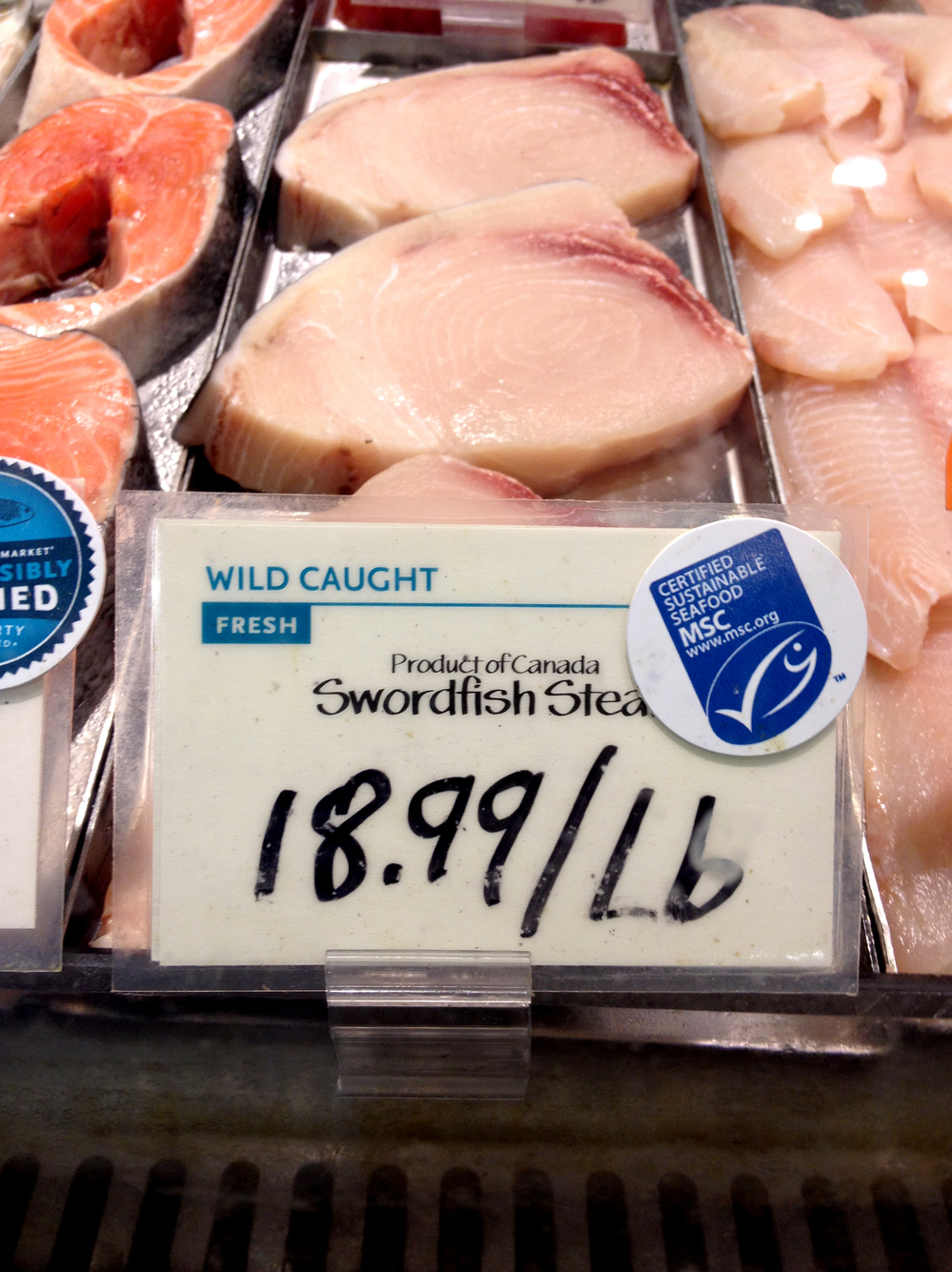 Enlarge image i
Enlarge image i Swordfish from Canada are marked with a label from the Marine Stewardship Council at a Whole Foods in Washington, D.C. The MSC says its label means the fish were caught by a sustainable fishery, but critics says it's not always so clear.

Swordfish from Canada are marked with a label from the Marine Stewardship Council at a Whole Foods in Washington, D.C. The MSC says its label means the fish were caught by a sustainable fishery, but critics says it's not always so clear.
Poll results from a recent survey of 3,000 Americans, conducted on behalf of NPR, by Truven Health Analytics. Questions were asked in general about sustainable seafood and labeling.

This week, our colleagues Daniel Zwerdling and Margot Williams with NPR's investigations unit have a terrific three-part series on the Marine Stewardship Council. As they report, the MSC's labels tell consumers which seafood is supposed to be good or bad for the environment. But some environmentalists say the label is misleading, and that the growing demand for sustainable-labeled seafood from retailers like Target and Whole Foods is pressuring the program to certify fisheries that don't deserve it.
As far as we could tell, no one had ever really asked regular consumers how they feel about seafood that's sustainably caught. So we teamed up with Zwerdling, Williams and Truven Health Analytics to find out. We asked 3,000 adults across the country about what the labels mean to them as part of an NPR-Truven Health Analytics Health Poll.
First, we learned that people's seafood consumption habits vary quite a bit. Roughly one in four respondents (24 percent) said they rarely or never eat seafood. But another 30 percent said they eat seafood at least four times a month.
The results from the poll showed that 80 percent of Americans who regularly eat fish say it is "important" or "very important" that the seafood they buy is caught using sustainable methods. ("Sustainable" was defined as still being plentiful for future generations, and caught using methods that did minimal harm to other animals in the sea.)
About 67 percent of respondents said they're "somewhat confident" in labels that call seafood "sustainable," while 20 percent don't believe them at all, and 14 percent said they're "very confident" in what labels suggest about how the seafood was caught.
Many are under the impression that wild-caught fish is better for them: Fifty-two percent of those surveyed told us they believe that wild-caught fish or seafood has more health benefits than other types of fish.
The poll also found that people not only support the idea of sustainable seafood they are also willing to pay more for it. About a quarter of respondents said they would pay up to 10 percent more, while 22 percent said they would fork over between 10 and 20 percent extra for products they believed were sustainably caught.
The nationwide telephone poll of 3,004 adults was conducted during the first half of August 2012. Click here to read the questions and complete results. For more polls from Truven Health Analytics formerly the health care business of Thomson Reuters and NPR, see our archive.
Sustainable Eating & Nutrition Michael Pollan Frequently Asked Questions How do I eat vegetables and fruits seasonally and locally if I live somewhere with a long winter and a short growing season like Alaska? Is ... Making fishing sustainable - WWF - WWF Were working to secure a future for marine species, the millions of people who depend on fishing and your tuna sandwich The tuna sandwich that got you through ... Ecocentric A blog about food, water and energy ... On Whales, Oil and a Lot of Noise. Seismic testing for oil and gas under the Atlantic Ocean seafloor could injure up to ... Seafood Watch Program A Consumer's Guide to Sustainable Seafood ... Issues & What You Can Do Fishing practices worldwide are damaging our oceansdepleting fish populations, destroying habitats and polluting the water. American Feast's Sustainable Food Blog - Timely food news, fun ... What is Sustainable Food? Community Supported Agriculture at Roxbury Farm, An Alternative to Big Agra; Mexicali Chicken Recipe from Denise Szarek Full Program - SeafoodSummit.org Leading Voices for a Health Ocean Organizers: Herman Wisse (Global Sustainable Seafood Initiative) and Ned Daly (SeaWeb) Program Chair: Peter Hajipieris (Birdseye) The evolution of certification ... Program - SeafoodSummit.org Leading Voices for a Health Ocean A PDF version of the printed 10th International Seafood Summit Program is available for download here. Please note that changes to the program that occurred after ... Realtor Magazine Real Estate Tips, Trends, Data & More Its hard to keep up with latest social media site or this weeks most popular app. Tech expert David Pogue says you can ignore most of it, but there is one item ...
No comments:
Post a Comment